Leadership and Management for Service Industries: TUI Analysis
VerifiedAdded on 2020/11/12
|17
|5372
|233
Report
AI Summary
This report provides a comprehensive analysis of leadership and management practices within TUI, a major UK-based travel operator. It begins by exploring classical management theories such as bureaucracy, administrative theory, and scientific management, highlighting their application within the service industry context and specifically within TUI. The report then delves into the roles of leaders, different leadership styles (autocratic, democratic, delegative), and the leadership and management styles employed by TUI, emphasizing the use of democratic leadership and persuasive management. Furthermore, it examines the internal and external factors influencing TUI's management style and structure, including competitors and customers. The report assesses the current "hard" and "soft" skills of management and leadership, and discusses the future skills needed in the service sector. Finally, it compares and contrasts change management systems and leadership approaches across different service industry organizations, with a focus on TUI's strategies.
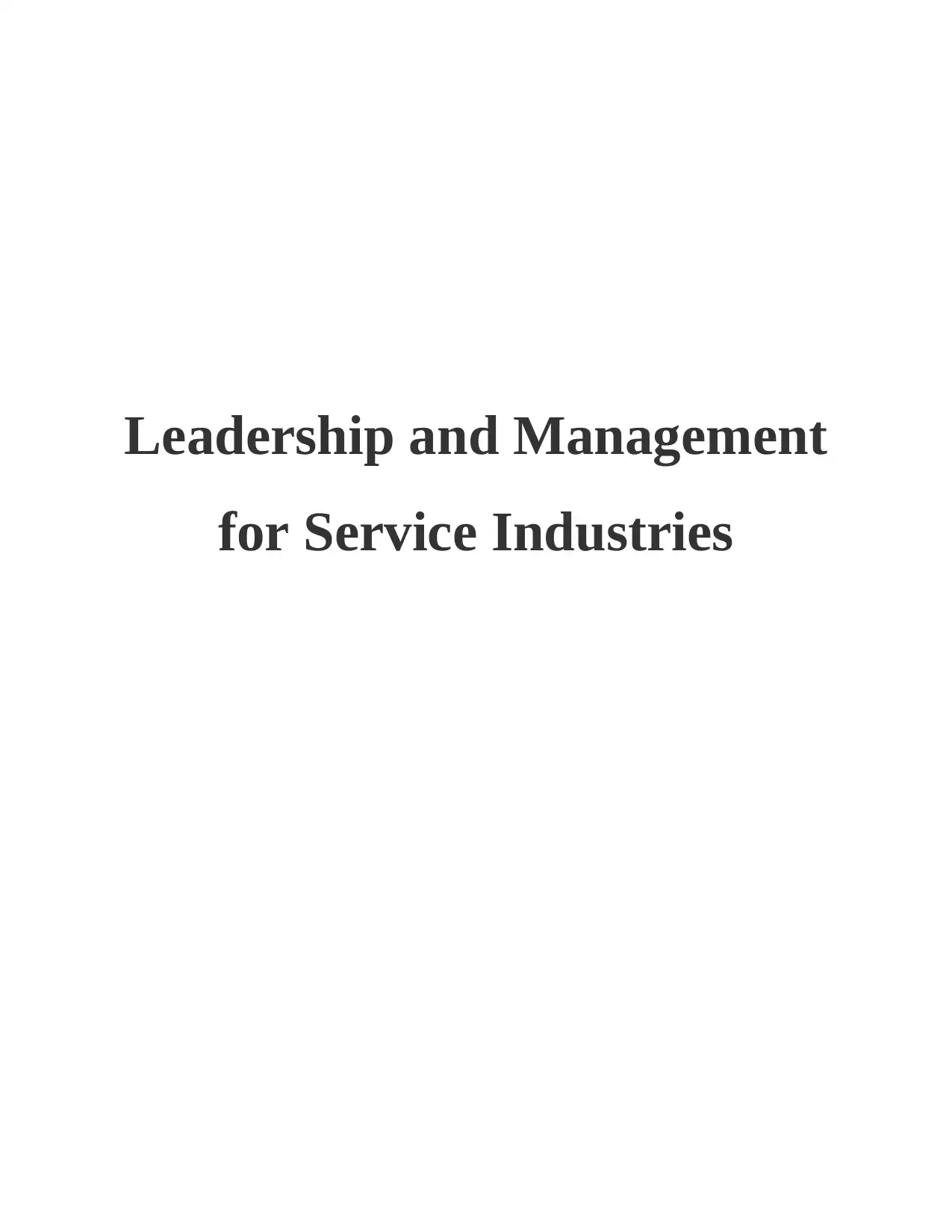
Leadership and Management
for Service Industries
for Service Industries
Paraphrase This Document
Need a fresh take? Get an instant paraphrase of this document with our AI Paraphraser
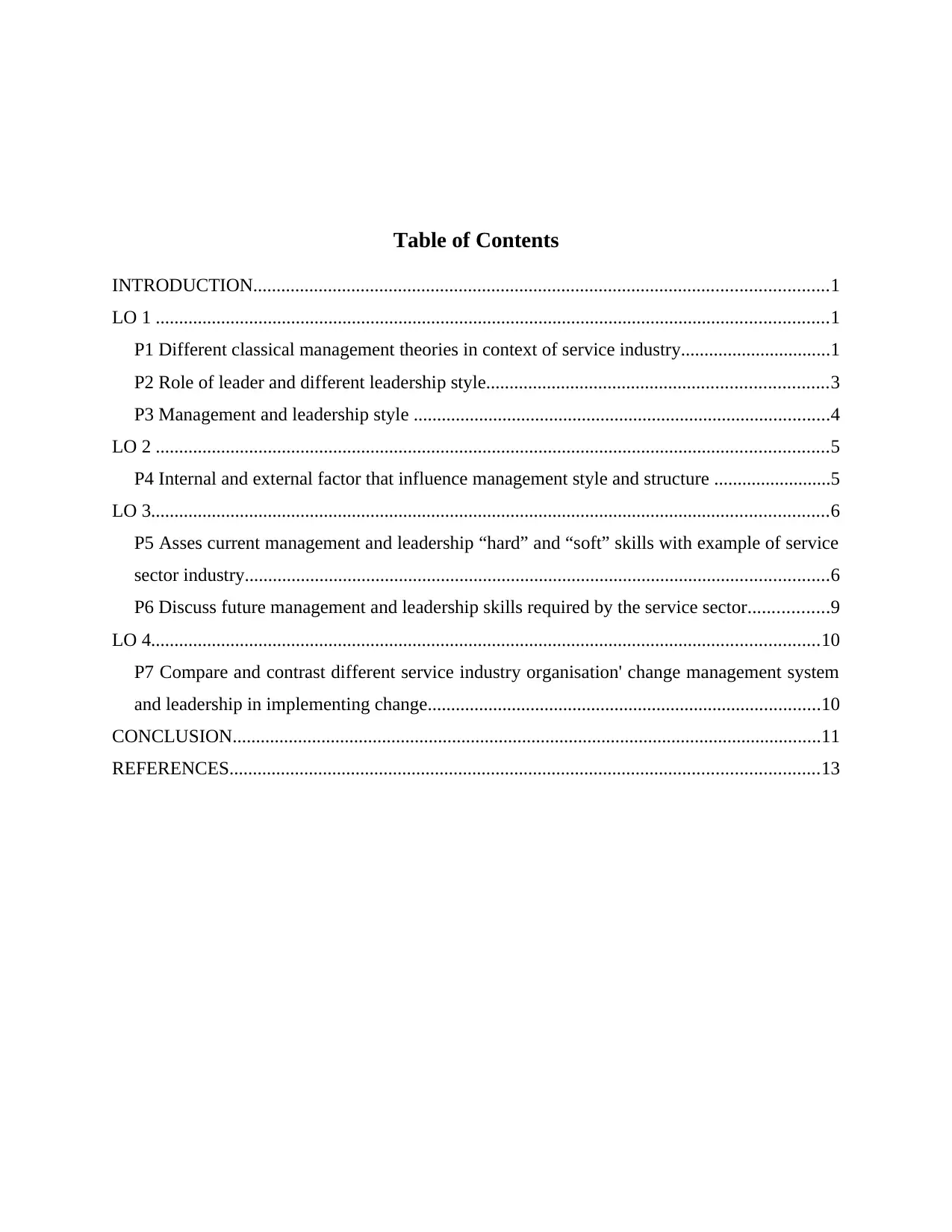
Table of Contents
INTRODUCTION...........................................................................................................................1
LO 1 ................................................................................................................................................1
P1 Different classical management theories in context of service industry................................1
P2 Role of leader and different leadership style.........................................................................3
P3 Management and leadership style .........................................................................................4
LO 2 ................................................................................................................................................5
P4 Internal and external factor that influence management style and structure .........................5
LO 3.................................................................................................................................................6
P5 Asses current management and leadership “hard” and “soft” skills with example of service
sector industry.............................................................................................................................6
P6 Discuss future management and leadership skills required by the service sector.................9
LO 4...............................................................................................................................................10
P7 Compare and contrast different service industry organisation' change management system
and leadership in implementing change....................................................................................10
CONCLUSION..............................................................................................................................11
REFERENCES..............................................................................................................................13
INTRODUCTION...........................................................................................................................1
LO 1 ................................................................................................................................................1
P1 Different classical management theories in context of service industry................................1
P2 Role of leader and different leadership style.........................................................................3
P3 Management and leadership style .........................................................................................4
LO 2 ................................................................................................................................................5
P4 Internal and external factor that influence management style and structure .........................5
LO 3.................................................................................................................................................6
P5 Asses current management and leadership “hard” and “soft” skills with example of service
sector industry.............................................................................................................................6
P6 Discuss future management and leadership skills required by the service sector.................9
LO 4...............................................................................................................................................10
P7 Compare and contrast different service industry organisation' change management system
and leadership in implementing change....................................................................................10
CONCLUSION..............................................................................................................................11
REFERENCES..............................................................................................................................13
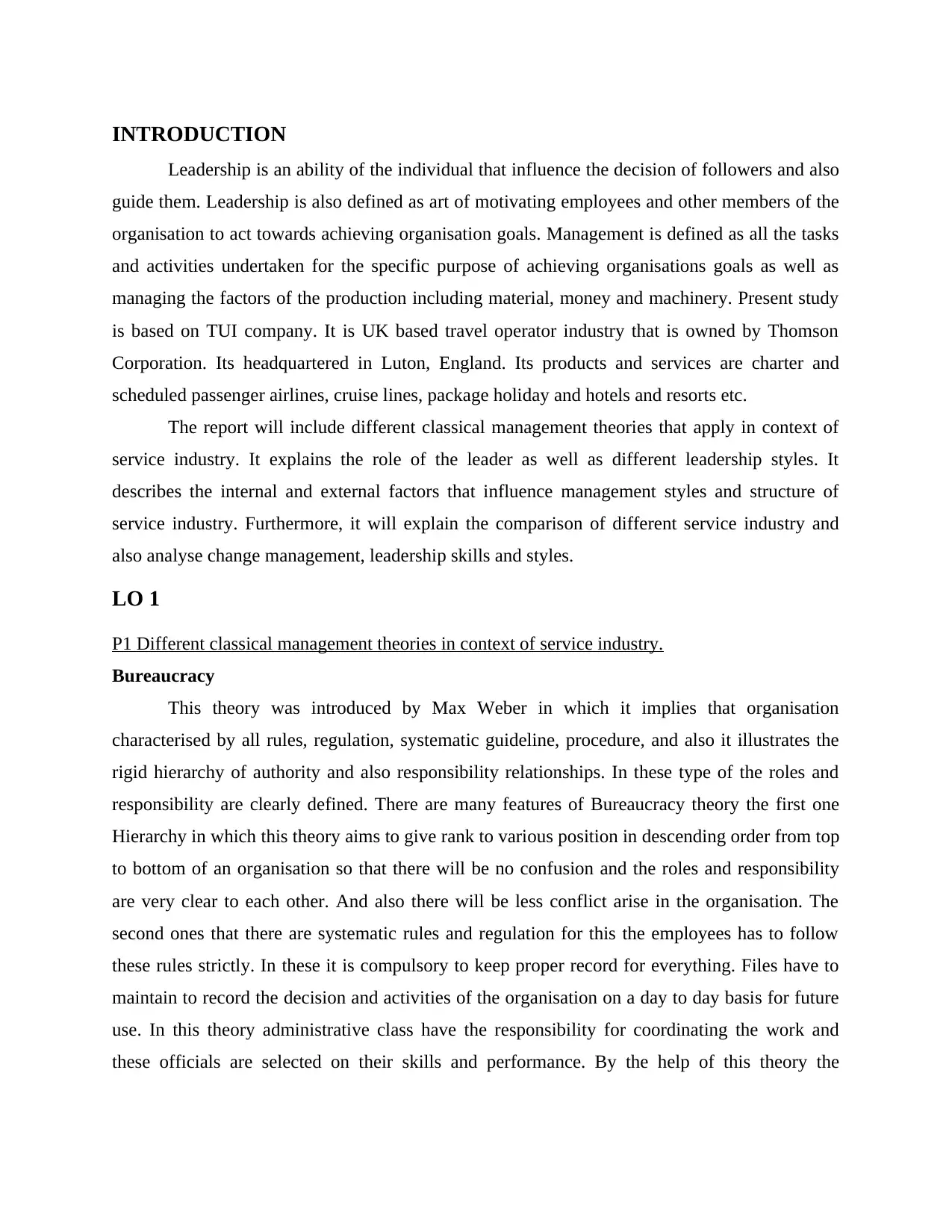
INTRODUCTION
Leadership is an ability of the individual that influence the decision of followers and also
guide them. Leadership is also defined as art of motivating employees and other members of the
organisation to act towards achieving organisation goals. Management is defined as all the tasks
and activities undertaken for the specific purpose of achieving organisations goals as well as
managing the factors of the production including material, money and machinery. Present study
is based on TUI company. It is UK based travel operator industry that is owned by Thomson
Corporation. Its headquartered in Luton, England. Its products and services are charter and
scheduled passenger airlines, cruise lines, package holiday and hotels and resorts etc.
The report will include different classical management theories that apply in context of
service industry. It explains the role of the leader as well as different leadership styles. It
describes the internal and external factors that influence management styles and structure of
service industry. Furthermore, it will explain the comparison of different service industry and
also analyse change management, leadership skills and styles.
LO 1
P1 Different classical management theories in context of service industry.
Bureaucracy
This theory was introduced by Max Weber in which it implies that organisation
characterised by all rules, regulation, systematic guideline, procedure, and also it illustrates the
rigid hierarchy of authority and also responsibility relationships. In these type of the roles and
responsibility are clearly defined. There are many features of Bureaucracy theory the first one
Hierarchy in which this theory aims to give rank to various position in descending order from top
to bottom of an organisation so that there will be no confusion and the roles and responsibility
are very clear to each other. And also there will be less conflict arise in the organisation. The
second ones that there are systematic rules and regulation for this the employees has to follow
these rules strictly. In these it is compulsory to keep proper record for everything. Files have to
maintain to record the decision and activities of the organisation on a day to day basis for future
use. In this theory administrative class have the responsibility for coordinating the work and
these officials are selected on their skills and performance. By the help of this theory the
Leadership is an ability of the individual that influence the decision of followers and also
guide them. Leadership is also defined as art of motivating employees and other members of the
organisation to act towards achieving organisation goals. Management is defined as all the tasks
and activities undertaken for the specific purpose of achieving organisations goals as well as
managing the factors of the production including material, money and machinery. Present study
is based on TUI company. It is UK based travel operator industry that is owned by Thomson
Corporation. Its headquartered in Luton, England. Its products and services are charter and
scheduled passenger airlines, cruise lines, package holiday and hotels and resorts etc.
The report will include different classical management theories that apply in context of
service industry. It explains the role of the leader as well as different leadership styles. It
describes the internal and external factors that influence management styles and structure of
service industry. Furthermore, it will explain the comparison of different service industry and
also analyse change management, leadership skills and styles.
LO 1
P1 Different classical management theories in context of service industry.
Bureaucracy
This theory was introduced by Max Weber in which it implies that organisation
characterised by all rules, regulation, systematic guideline, procedure, and also it illustrates the
rigid hierarchy of authority and also responsibility relationships. In these type of the roles and
responsibility are clearly defined. There are many features of Bureaucracy theory the first one
Hierarchy in which this theory aims to give rank to various position in descending order from top
to bottom of an organisation so that there will be no confusion and the roles and responsibility
are very clear to each other. And also there will be less conflict arise in the organisation. The
second ones that there are systematic rules and regulation for this the employees has to follow
these rules strictly. In these it is compulsory to keep proper record for everything. Files have to
maintain to record the decision and activities of the organisation on a day to day basis for future
use. In this theory administrative class have the responsibility for coordinating the work and
these officials are selected on their skills and performance. By the help of this theory the
⊘ This is a preview!⊘
Do you want full access?
Subscribe today to unlock all pages.

Trusted by 1+ million students worldwide
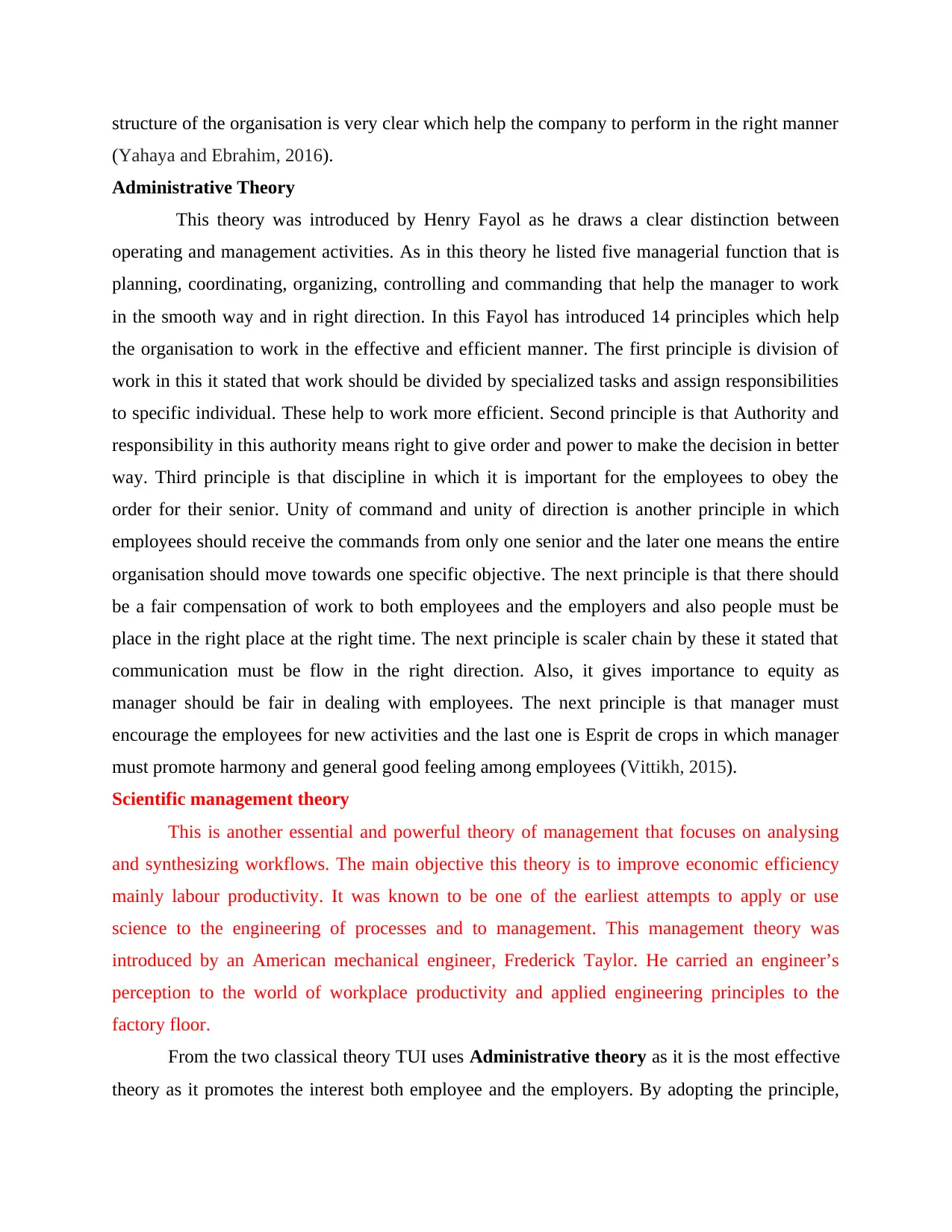
structure of the organisation is very clear which help the company to perform in the right manner
(Yahaya and Ebrahim, 2016).
Administrative Theory
This theory was introduced by Henry Fayol as he draws a clear distinction between
operating and management activities. As in this theory he listed five managerial function that is
planning, coordinating, organizing, controlling and commanding that help the manager to work
in the smooth way and in right direction. In this Fayol has introduced 14 principles which help
the organisation to work in the effective and efficient manner. The first principle is division of
work in this it stated that work should be divided by specialized tasks and assign responsibilities
to specific individual. These help to work more efficient. Second principle is that Authority and
responsibility in this authority means right to give order and power to make the decision in better
way. Third principle is that discipline in which it is important for the employees to obey the
order for their senior. Unity of command and unity of direction is another principle in which
employees should receive the commands from only one senior and the later one means the entire
organisation should move towards one specific objective. The next principle is that there should
be a fair compensation of work to both employees and the employers and also people must be
place in the right place at the right time. The next principle is scaler chain by these it stated that
communication must be flow in the right direction. Also, it gives importance to equity as
manager should be fair in dealing with employees. The next principle is that manager must
encourage the employees for new activities and the last one is Esprit de crops in which manager
must promote harmony and general good feeling among employees (Vittikh, 2015).
Scientific management theory
This is another essential and powerful theory of management that focuses on analysing
and synthesizing workflows. The main objective this theory is to improve economic efficiency
mainly labour productivity. It was known to be one of the earliest attempts to apply or use
science to the engineering of processes and to management. This management theory was
introduced by an American mechanical engineer, Frederick Taylor. He carried an engineer’s
perception to the world of workplace productivity and applied engineering principles to the
factory floor.
From the two classical theory TUI uses Administrative theory as it is the most effective
theory as it promotes the interest both employee and the employers. By adopting the principle,
(Yahaya and Ebrahim, 2016).
Administrative Theory
This theory was introduced by Henry Fayol as he draws a clear distinction between
operating and management activities. As in this theory he listed five managerial function that is
planning, coordinating, organizing, controlling and commanding that help the manager to work
in the smooth way and in right direction. In this Fayol has introduced 14 principles which help
the organisation to work in the effective and efficient manner. The first principle is division of
work in this it stated that work should be divided by specialized tasks and assign responsibilities
to specific individual. These help to work more efficient. Second principle is that Authority and
responsibility in this authority means right to give order and power to make the decision in better
way. Third principle is that discipline in which it is important for the employees to obey the
order for their senior. Unity of command and unity of direction is another principle in which
employees should receive the commands from only one senior and the later one means the entire
organisation should move towards one specific objective. The next principle is that there should
be a fair compensation of work to both employees and the employers and also people must be
place in the right place at the right time. The next principle is scaler chain by these it stated that
communication must be flow in the right direction. Also, it gives importance to equity as
manager should be fair in dealing with employees. The next principle is that manager must
encourage the employees for new activities and the last one is Esprit de crops in which manager
must promote harmony and general good feeling among employees (Vittikh, 2015).
Scientific management theory
This is another essential and powerful theory of management that focuses on analysing
and synthesizing workflows. The main objective this theory is to improve economic efficiency
mainly labour productivity. It was known to be one of the earliest attempts to apply or use
science to the engineering of processes and to management. This management theory was
introduced by an American mechanical engineer, Frederick Taylor. He carried an engineer’s
perception to the world of workplace productivity and applied engineering principles to the
factory floor.
From the two classical theory TUI uses Administrative theory as it is the most effective
theory as it promotes the interest both employee and the employers. By adopting the principle,
Paraphrase This Document
Need a fresh take? Get an instant paraphrase of this document with our AI Paraphraser
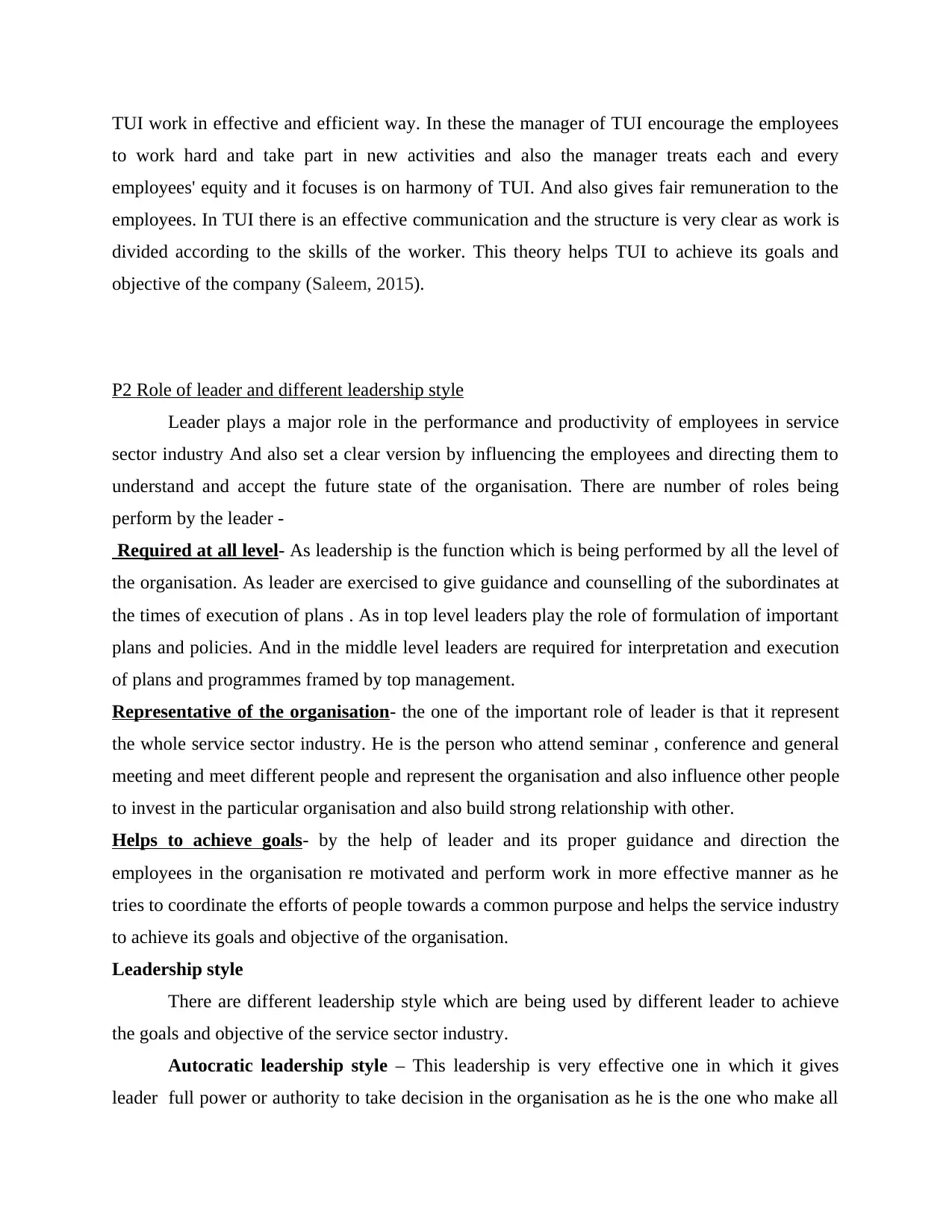
TUI work in effective and efficient way. In these the manager of TUI encourage the employees
to work hard and take part in new activities and also the manager treats each and every
employees' equity and it focuses is on harmony of TUI. And also gives fair remuneration to the
employees. In TUI there is an effective communication and the structure is very clear as work is
divided according to the skills of the worker. This theory helps TUI to achieve its goals and
objective of the company (Saleem, 2015).
P2 Role of leader and different leadership style
Leader plays a major role in the performance and productivity of employees in service
sector industry And also set a clear version by influencing the employees and directing them to
understand and accept the future state of the organisation. There are number of roles being
perform by the leader -
Required at all level- As leadership is the function which is being performed by all the level of
the organisation. As leader are exercised to give guidance and counselling of the subordinates at
the times of execution of plans . As in top level leaders play the role of formulation of important
plans and policies. And in the middle level leaders are required for interpretation and execution
of plans and programmes framed by top management.
Representative of the organisation- the one of the important role of leader is that it represent
the whole service sector industry. He is the person who attend seminar , conference and general
meeting and meet different people and represent the organisation and also influence other people
to invest in the particular organisation and also build strong relationship with other.
Helps to achieve goals- by the help of leader and its proper guidance and direction the
employees in the organisation re motivated and perform work in more effective manner as he
tries to coordinate the efforts of people towards a common purpose and helps the service industry
to achieve its goals and objective of the organisation.
Leadership style
There are different leadership style which are being used by different leader to achieve
the goals and objective of the service sector industry.
Autocratic leadership style – This leadership is very effective one in which it gives
leader full power or authority to take decision in the organisation as he is the one who make all
to work hard and take part in new activities and also the manager treats each and every
employees' equity and it focuses is on harmony of TUI. And also gives fair remuneration to the
employees. In TUI there is an effective communication and the structure is very clear as work is
divided according to the skills of the worker. This theory helps TUI to achieve its goals and
objective of the company (Saleem, 2015).
P2 Role of leader and different leadership style
Leader plays a major role in the performance and productivity of employees in service
sector industry And also set a clear version by influencing the employees and directing them to
understand and accept the future state of the organisation. There are number of roles being
perform by the leader -
Required at all level- As leadership is the function which is being performed by all the level of
the organisation. As leader are exercised to give guidance and counselling of the subordinates at
the times of execution of plans . As in top level leaders play the role of formulation of important
plans and policies. And in the middle level leaders are required for interpretation and execution
of plans and programmes framed by top management.
Representative of the organisation- the one of the important role of leader is that it represent
the whole service sector industry. He is the person who attend seminar , conference and general
meeting and meet different people and represent the organisation and also influence other people
to invest in the particular organisation and also build strong relationship with other.
Helps to achieve goals- by the help of leader and its proper guidance and direction the
employees in the organisation re motivated and perform work in more effective manner as he
tries to coordinate the efforts of people towards a common purpose and helps the service industry
to achieve its goals and objective of the organisation.
Leadership style
There are different leadership style which are being used by different leader to achieve
the goals and objective of the service sector industry.
Autocratic leadership style – This leadership is very effective one in which it gives
leader full power or authority to take decision in the organisation as he is the one who make all
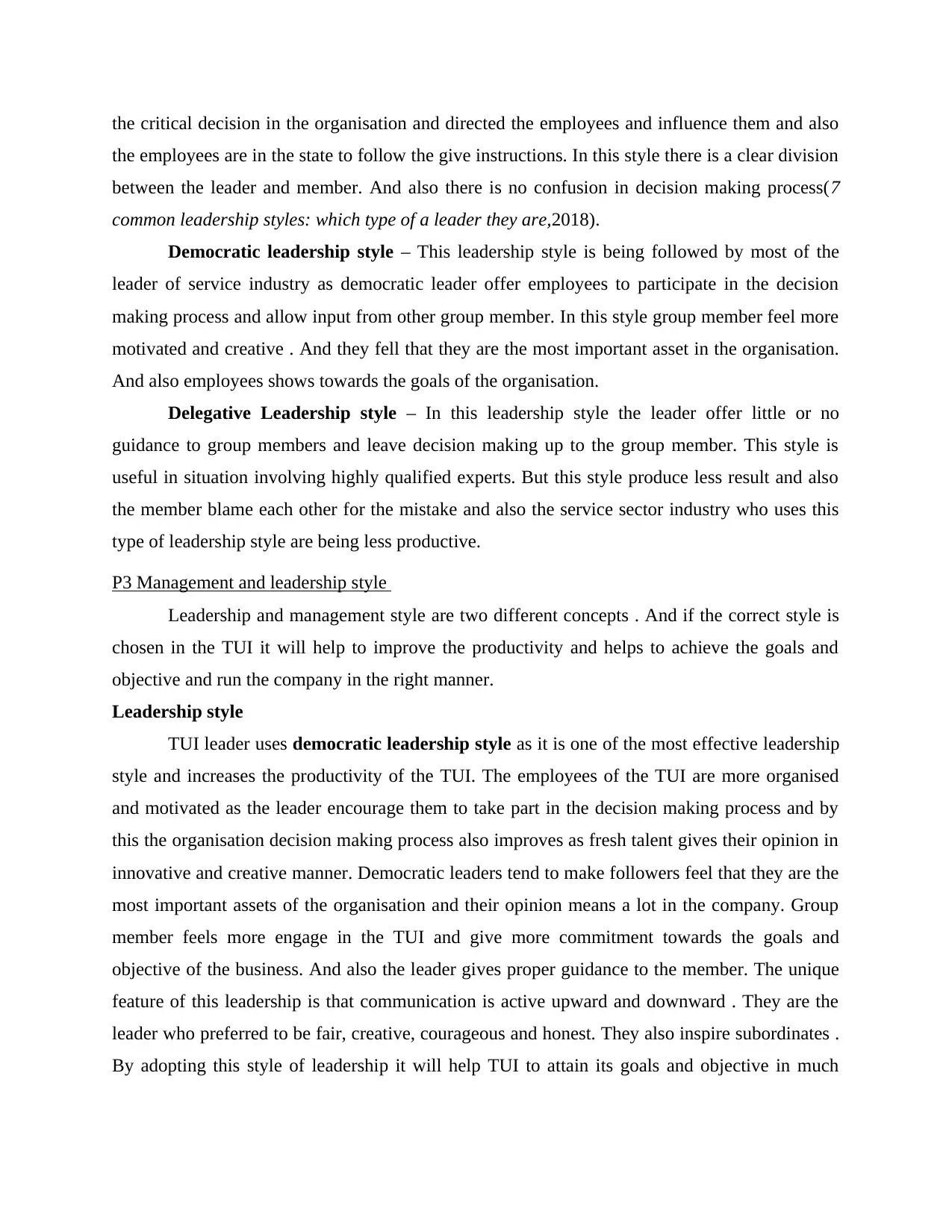
the critical decision in the organisation and directed the employees and influence them and also
the employees are in the state to follow the give instructions. In this style there is a clear division
between the leader and member. And also there is no confusion in decision making process(7
common leadership styles: which type of a leader they are,2018).
Democratic leadership style – This leadership style is being followed by most of the
leader of service industry as democratic leader offer employees to participate in the decision
making process and allow input from other group member. In this style group member feel more
motivated and creative . And they fell that they are the most important asset in the organisation.
And also employees shows towards the goals of the organisation.
Delegative Leadership style – In this leadership style the leader offer little or no
guidance to group members and leave decision making up to the group member. This style is
useful in situation involving highly qualified experts. But this style produce less result and also
the member blame each other for the mistake and also the service sector industry who uses this
type of leadership style are being less productive.
P3 Management and leadership style
Leadership and management style are two different concepts . And if the correct style is
chosen in the TUI it will help to improve the productivity and helps to achieve the goals and
objective and run the company in the right manner.
Leadership style
TUI leader uses democratic leadership style as it is one of the most effective leadership
style and increases the productivity of the TUI. The employees of the TUI are more organised
and motivated as the leader encourage them to take part in the decision making process and by
this the organisation decision making process also improves as fresh talent gives their opinion in
innovative and creative manner. Democratic leaders tend to make followers feel that they are the
most important assets of the organisation and their opinion means a lot in the company. Group
member feels more engage in the TUI and give more commitment towards the goals and
objective of the business. And also the leader gives proper guidance to the member. The unique
feature of this leadership is that communication is active upward and downward . They are the
leader who preferred to be fair, creative, courageous and honest. They also inspire subordinates .
By adopting this style of leadership it will help TUI to attain its goals and objective in much
the employees are in the state to follow the give instructions. In this style there is a clear division
between the leader and member. And also there is no confusion in decision making process(7
common leadership styles: which type of a leader they are,2018).
Democratic leadership style – This leadership style is being followed by most of the
leader of service industry as democratic leader offer employees to participate in the decision
making process and allow input from other group member. In this style group member feel more
motivated and creative . And they fell that they are the most important asset in the organisation.
And also employees shows towards the goals of the organisation.
Delegative Leadership style – In this leadership style the leader offer little or no
guidance to group members and leave decision making up to the group member. This style is
useful in situation involving highly qualified experts. But this style produce less result and also
the member blame each other for the mistake and also the service sector industry who uses this
type of leadership style are being less productive.
P3 Management and leadership style
Leadership and management style are two different concepts . And if the correct style is
chosen in the TUI it will help to improve the productivity and helps to achieve the goals and
objective and run the company in the right manner.
Leadership style
TUI leader uses democratic leadership style as it is one of the most effective leadership
style and increases the productivity of the TUI. The employees of the TUI are more organised
and motivated as the leader encourage them to take part in the decision making process and by
this the organisation decision making process also improves as fresh talent gives their opinion in
innovative and creative manner. Democratic leaders tend to make followers feel that they are the
most important assets of the organisation and their opinion means a lot in the company. Group
member feels more engage in the TUI and give more commitment towards the goals and
objective of the business. And also the leader gives proper guidance to the member. The unique
feature of this leadership is that communication is active upward and downward . They are the
leader who preferred to be fair, creative, courageous and honest. They also inspire subordinates .
By adopting this style of leadership it will help TUI to attain its goals and objective in much
⊘ This is a preview!⊘
Do you want full access?
Subscribe today to unlock all pages.

Trusted by 1+ million students worldwide
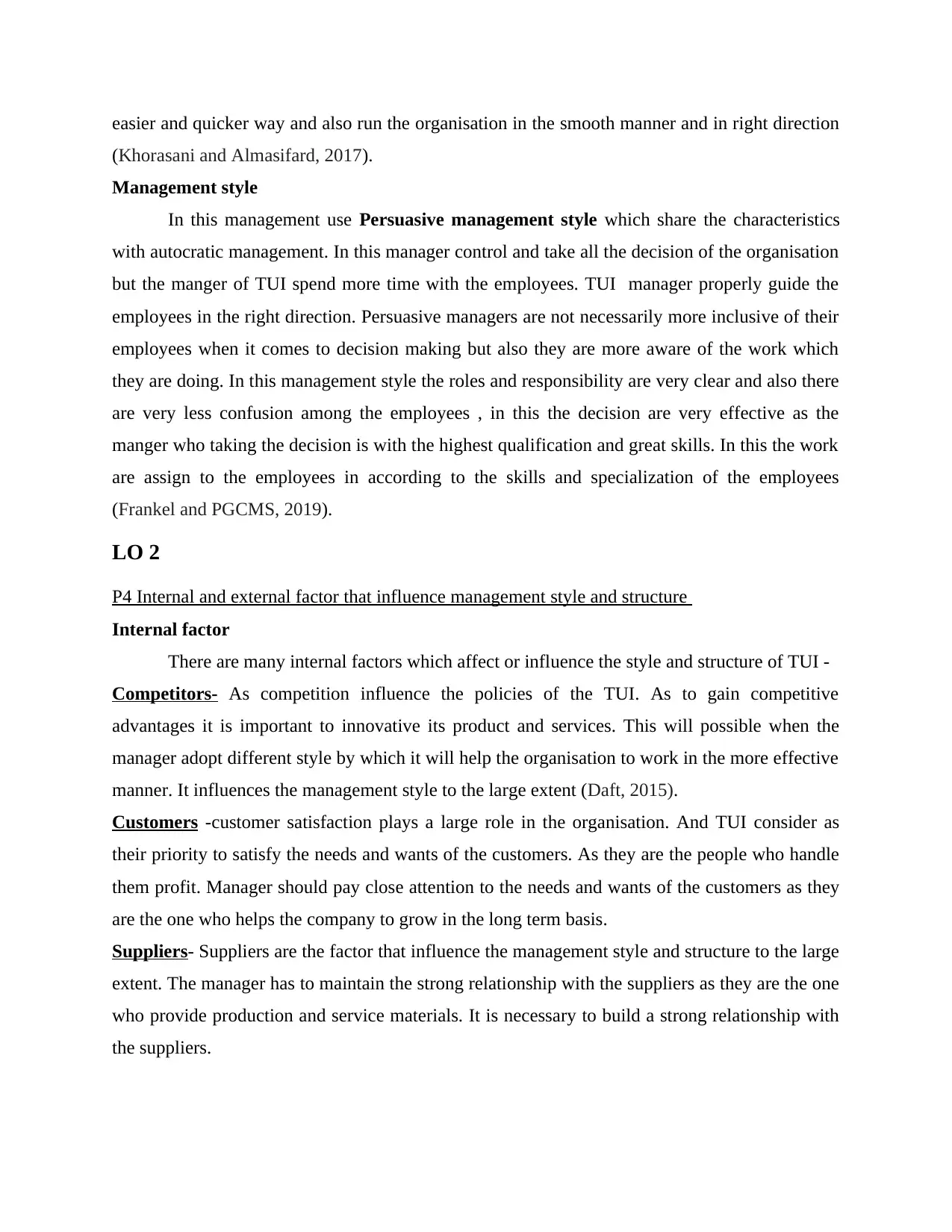
easier and quicker way and also run the organisation in the smooth manner and in right direction
(Khorasani and Almasifard, 2017).
Management style
In this management use Persuasive management style which share the characteristics
with autocratic management. In this manager control and take all the decision of the organisation
but the manger of TUI spend more time with the employees. TUI manager properly guide the
employees in the right direction. Persuasive managers are not necessarily more inclusive of their
employees when it comes to decision making but also they are more aware of the work which
they are doing. In this management style the roles and responsibility are very clear and also there
are very less confusion among the employees , in this the decision are very effective as the
manger who taking the decision is with the highest qualification and great skills. In this the work
are assign to the employees in according to the skills and specialization of the employees
(Frankel and PGCMS, 2019).
LO 2
P4 Internal and external factor that influence management style and structure
Internal factor
There are many internal factors which affect or influence the style and structure of TUI -
Competitors- As competition influence the policies of the TUI. As to gain competitive
advantages it is important to innovative its product and services. This will possible when the
manager adopt different style by which it will help the organisation to work in the more effective
manner. It influences the management style to the large extent (Daft, 2015).
Customers -customer satisfaction plays a large role in the organisation. And TUI consider as
their priority to satisfy the needs and wants of the customers. As they are the people who handle
them profit. Manager should pay close attention to the needs and wants of the customers as they
are the one who helps the company to grow in the long term basis.
Suppliers- Suppliers are the factor that influence the management style and structure to the large
extent. The manager has to maintain the strong relationship with the suppliers as they are the one
who provide production and service materials. It is necessary to build a strong relationship with
the suppliers.
(Khorasani and Almasifard, 2017).
Management style
In this management use Persuasive management style which share the characteristics
with autocratic management. In this manager control and take all the decision of the organisation
but the manger of TUI spend more time with the employees. TUI manager properly guide the
employees in the right direction. Persuasive managers are not necessarily more inclusive of their
employees when it comes to decision making but also they are more aware of the work which
they are doing. In this management style the roles and responsibility are very clear and also there
are very less confusion among the employees , in this the decision are very effective as the
manger who taking the decision is with the highest qualification and great skills. In this the work
are assign to the employees in according to the skills and specialization of the employees
(Frankel and PGCMS, 2019).
LO 2
P4 Internal and external factor that influence management style and structure
Internal factor
There are many internal factors which affect or influence the style and structure of TUI -
Competitors- As competition influence the policies of the TUI. As to gain competitive
advantages it is important to innovative its product and services. This will possible when the
manager adopt different style by which it will help the organisation to work in the more effective
manner. It influences the management style to the large extent (Daft, 2015).
Customers -customer satisfaction plays a large role in the organisation. And TUI consider as
their priority to satisfy the needs and wants of the customers. As they are the people who handle
them profit. Manager should pay close attention to the needs and wants of the customers as they
are the one who helps the company to grow in the long term basis.
Suppliers- Suppliers are the factor that influence the management style and structure to the large
extent. The manager has to maintain the strong relationship with the suppliers as they are the one
who provide production and service materials. It is necessary to build a strong relationship with
the suppliers.
Paraphrase This Document
Need a fresh take? Get an instant paraphrase of this document with our AI Paraphraser
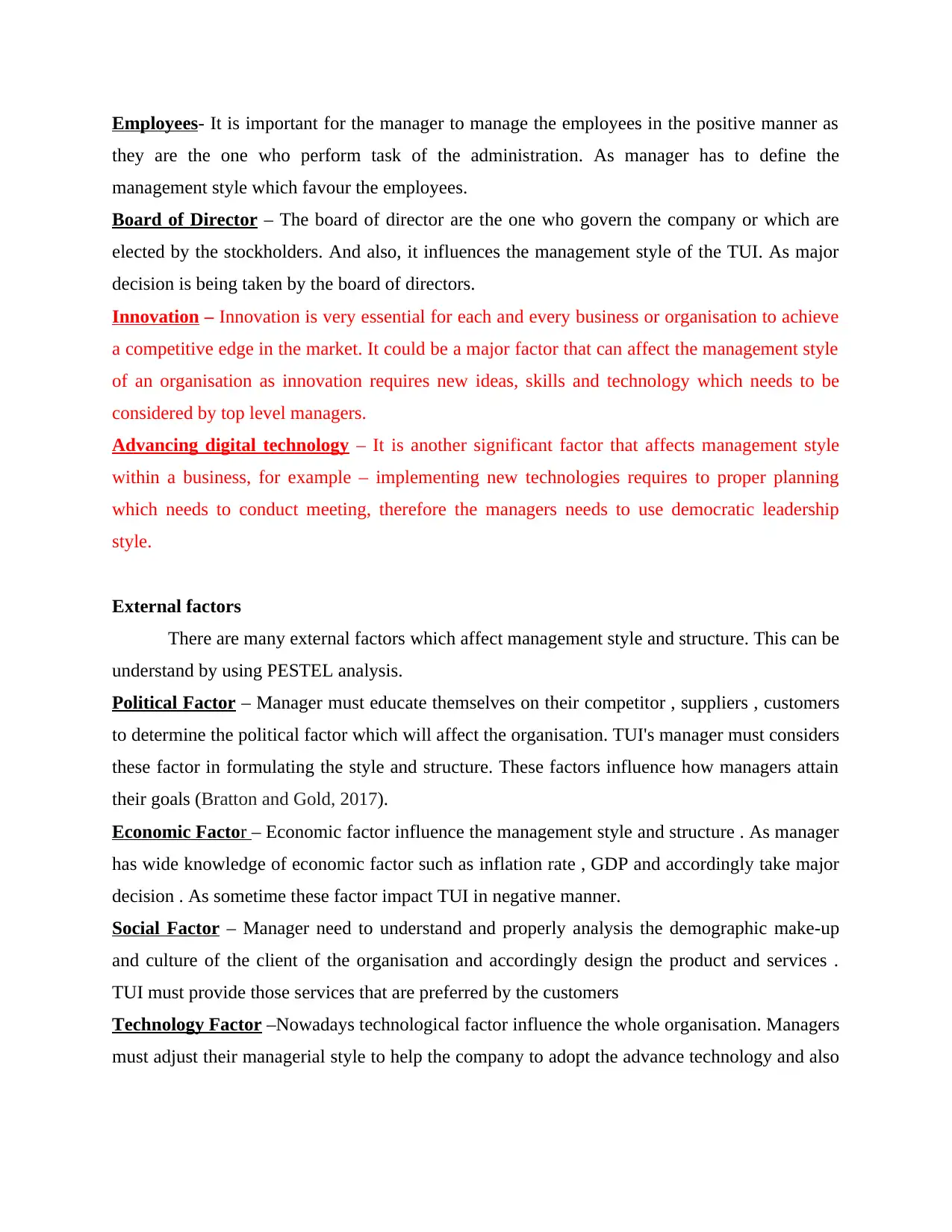
Employees- It is important for the manager to manage the employees in the positive manner as
they are the one who perform task of the administration. As manager has to define the
management style which favour the employees.
Board of Director – The board of director are the one who govern the company or which are
elected by the stockholders. And also, it influences the management style of the TUI. As major
decision is being taken by the board of directors.
Innovation – Innovation is very essential for each and every business or organisation to achieve
a competitive edge in the market. It could be a major factor that can affect the management style
of an organisation as innovation requires new ideas, skills and technology which needs to be
considered by top level managers.
Advancing digital technology – It is another significant factor that affects management style
within a business, for example – implementing new technologies requires to proper planning
which needs to conduct meeting, therefore the managers needs to use democratic leadership
style.
External factors
There are many external factors which affect management style and structure. This can be
understand by using PESTEL analysis.
Political Factor – Manager must educate themselves on their competitor , suppliers , customers
to determine the political factor which will affect the organisation. TUI's manager must considers
these factor in formulating the style and structure. These factors influence how managers attain
their goals (Bratton and Gold, 2017).
Economic Factor – Economic factor influence the management style and structure . As manager
has wide knowledge of economic factor such as inflation rate , GDP and accordingly take major
decision . As sometime these factor impact TUI in negative manner.
Social Factor – Manager need to understand and properly analysis the demographic make-up
and culture of the client of the organisation and accordingly design the product and services .
TUI must provide those services that are preferred by the customers
Technology Factor –Nowadays technological factor influence the whole organisation. Managers
must adjust their managerial style to help the company to adopt the advance technology and also
they are the one who perform task of the administration. As manager has to define the
management style which favour the employees.
Board of Director – The board of director are the one who govern the company or which are
elected by the stockholders. And also, it influences the management style of the TUI. As major
decision is being taken by the board of directors.
Innovation – Innovation is very essential for each and every business or organisation to achieve
a competitive edge in the market. It could be a major factor that can affect the management style
of an organisation as innovation requires new ideas, skills and technology which needs to be
considered by top level managers.
Advancing digital technology – It is another significant factor that affects management style
within a business, for example – implementing new technologies requires to proper planning
which needs to conduct meeting, therefore the managers needs to use democratic leadership
style.
External factors
There are many external factors which affect management style and structure. This can be
understand by using PESTEL analysis.
Political Factor – Manager must educate themselves on their competitor , suppliers , customers
to determine the political factor which will affect the organisation. TUI's manager must considers
these factor in formulating the style and structure. These factors influence how managers attain
their goals (Bratton and Gold, 2017).
Economic Factor – Economic factor influence the management style and structure . As manager
has wide knowledge of economic factor such as inflation rate , GDP and accordingly take major
decision . As sometime these factor impact TUI in negative manner.
Social Factor – Manager need to understand and properly analysis the demographic make-up
and culture of the client of the organisation and accordingly design the product and services .
TUI must provide those services that are preferred by the customers
Technology Factor –Nowadays technological factor influence the whole organisation. Managers
must adjust their managerial style to help the company to adopt the advance technology and also
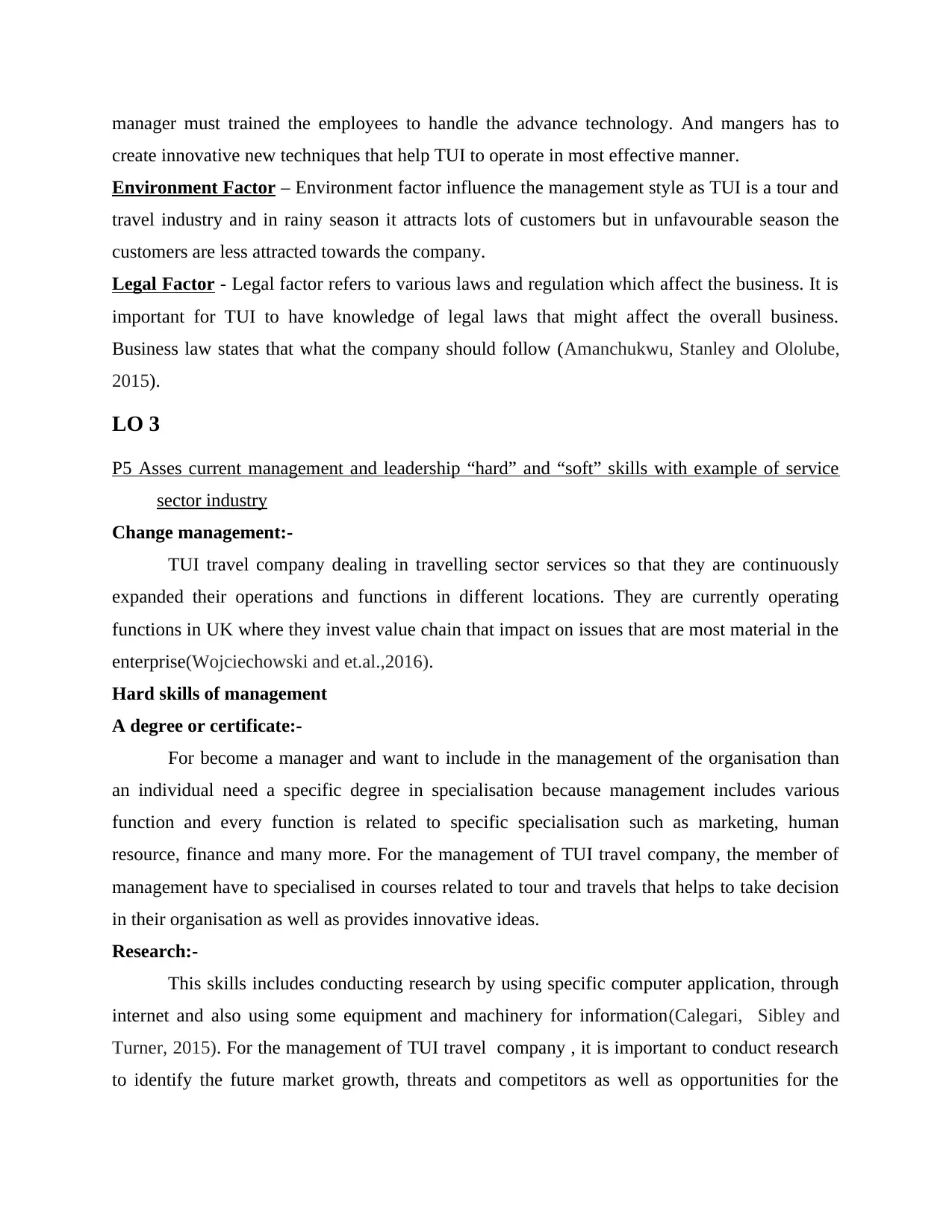
manager must trained the employees to handle the advance technology. And mangers has to
create innovative new techniques that help TUI to operate in most effective manner.
Environment Factor – Environment factor influence the management style as TUI is a tour and
travel industry and in rainy season it attracts lots of customers but in unfavourable season the
customers are less attracted towards the company.
Legal Factor - Legal factor refers to various laws and regulation which affect the business. It is
important for TUI to have knowledge of legal laws that might affect the overall business.
Business law states that what the company should follow (Amanchukwu, Stanley and Ololube,
2015).
LO 3
P5 Asses current management and leadership “hard” and “soft” skills with example of service
sector industry
Change management:-
TUI travel company dealing in travelling sector services so that they are continuously
expanded their operations and functions in different locations. They are currently operating
functions in UK where they invest value chain that impact on issues that are most material in the
enterprise(Wojciechowski and et.al.,2016).
Hard skills of management
A degree or certificate:-
For become a manager and want to include in the management of the organisation than
an individual need a specific degree in specialisation because management includes various
function and every function is related to specific specialisation such as marketing, human
resource, finance and many more. For the management of TUI travel company, the member of
management have to specialised in courses related to tour and travels that helps to take decision
in their organisation as well as provides innovative ideas.
Research:-
This skills includes conducting research by using specific computer application, through
internet and also using some equipment and machinery for information(Calegari, Sibley and
Turner, 2015). For the management of TUI travel company , it is important to conduct research
to identify the future market growth, threats and competitors as well as opportunities for the
create innovative new techniques that help TUI to operate in most effective manner.
Environment Factor – Environment factor influence the management style as TUI is a tour and
travel industry and in rainy season it attracts lots of customers but in unfavourable season the
customers are less attracted towards the company.
Legal Factor - Legal factor refers to various laws and regulation which affect the business. It is
important for TUI to have knowledge of legal laws that might affect the overall business.
Business law states that what the company should follow (Amanchukwu, Stanley and Ololube,
2015).
LO 3
P5 Asses current management and leadership “hard” and “soft” skills with example of service
sector industry
Change management:-
TUI travel company dealing in travelling sector services so that they are continuously
expanded their operations and functions in different locations. They are currently operating
functions in UK where they invest value chain that impact on issues that are most material in the
enterprise(Wojciechowski and et.al.,2016).
Hard skills of management
A degree or certificate:-
For become a manager and want to include in the management of the organisation than
an individual need a specific degree in specialisation because management includes various
function and every function is related to specific specialisation such as marketing, human
resource, finance and many more. For the management of TUI travel company, the member of
management have to specialised in courses related to tour and travels that helps to take decision
in their organisation as well as provides innovative ideas.
Research:-
This skills includes conducting research by using specific computer application, through
internet and also using some equipment and machinery for information(Calegari, Sibley and
Turner, 2015). For the management of TUI travel company , it is important to conduct research
to identify the future market growth, threats and competitors as well as opportunities for the
⊘ This is a preview!⊘
Do you want full access?
Subscribe today to unlock all pages.

Trusted by 1+ million students worldwide
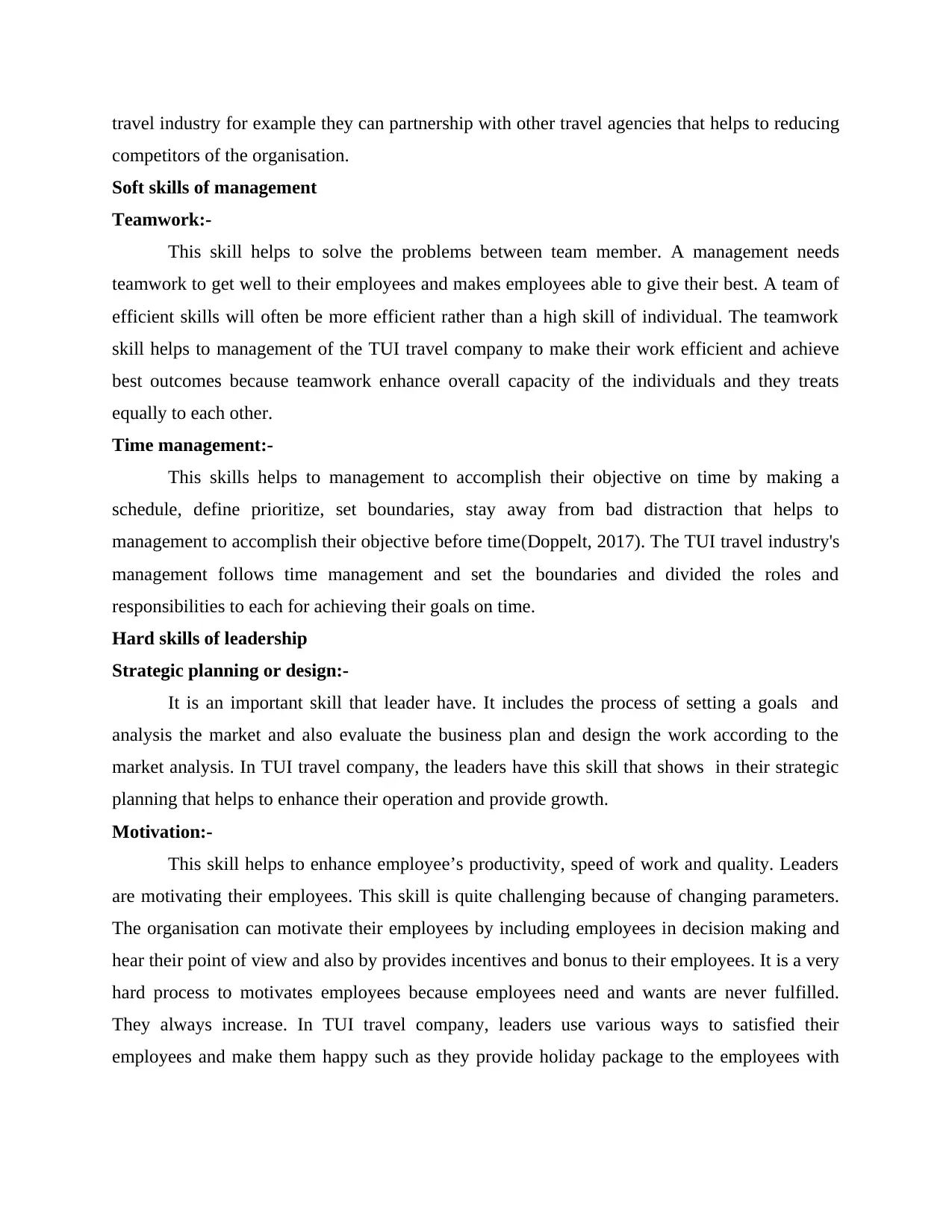
travel industry for example they can partnership with other travel agencies that helps to reducing
competitors of the organisation.
Soft skills of management
Teamwork:-
This skill helps to solve the problems between team member. A management needs
teamwork to get well to their employees and makes employees able to give their best. A team of
efficient skills will often be more efficient rather than a high skill of individual. The teamwork
skill helps to management of the TUI travel company to make their work efficient and achieve
best outcomes because teamwork enhance overall capacity of the individuals and they treats
equally to each other.
Time management:-
This skills helps to management to accomplish their objective on time by making a
schedule, define prioritize, set boundaries, stay away from bad distraction that helps to
management to accomplish their objective before time(Doppelt, 2017). The TUI travel industry's
management follows time management and set the boundaries and divided the roles and
responsibilities to each for achieving their goals on time.
Hard skills of leadership
Strategic planning or design:-
It is an important skill that leader have. It includes the process of setting a goals and
analysis the market and also evaluate the business plan and design the work according to the
market analysis. In TUI travel company, the leaders have this skill that shows in their strategic
planning that helps to enhance their operation and provide growth.
Motivation:-
This skill helps to enhance employee’s productivity, speed of work and quality. Leaders
are motivating their employees. This skill is quite challenging because of changing parameters.
The organisation can motivate their employees by including employees in decision making and
hear their point of view and also by provides incentives and bonus to their employees. It is a very
hard process to motivates employees because employees need and wants are never fulfilled.
They always increase. In TUI travel company, leaders use various ways to satisfied their
employees and make them happy such as they provide holiday package to the employees with
competitors of the organisation.
Soft skills of management
Teamwork:-
This skill helps to solve the problems between team member. A management needs
teamwork to get well to their employees and makes employees able to give their best. A team of
efficient skills will often be more efficient rather than a high skill of individual. The teamwork
skill helps to management of the TUI travel company to make their work efficient and achieve
best outcomes because teamwork enhance overall capacity of the individuals and they treats
equally to each other.
Time management:-
This skills helps to management to accomplish their objective on time by making a
schedule, define prioritize, set boundaries, stay away from bad distraction that helps to
management to accomplish their objective before time(Doppelt, 2017). The TUI travel industry's
management follows time management and set the boundaries and divided the roles and
responsibilities to each for achieving their goals on time.
Hard skills of leadership
Strategic planning or design:-
It is an important skill that leader have. It includes the process of setting a goals and
analysis the market and also evaluate the business plan and design the work according to the
market analysis. In TUI travel company, the leaders have this skill that shows in their strategic
planning that helps to enhance their operation and provide growth.
Motivation:-
This skill helps to enhance employee’s productivity, speed of work and quality. Leaders
are motivating their employees. This skill is quite challenging because of changing parameters.
The organisation can motivate their employees by including employees in decision making and
hear their point of view and also by provides incentives and bonus to their employees. It is a very
hard process to motivates employees because employees need and wants are never fulfilled.
They always increase. In TUI travel company, leaders use various ways to satisfied their
employees and make them happy such as they provide holiday package to the employees with
Paraphrase This Document
Need a fresh take? Get an instant paraphrase of this document with our AI Paraphraser
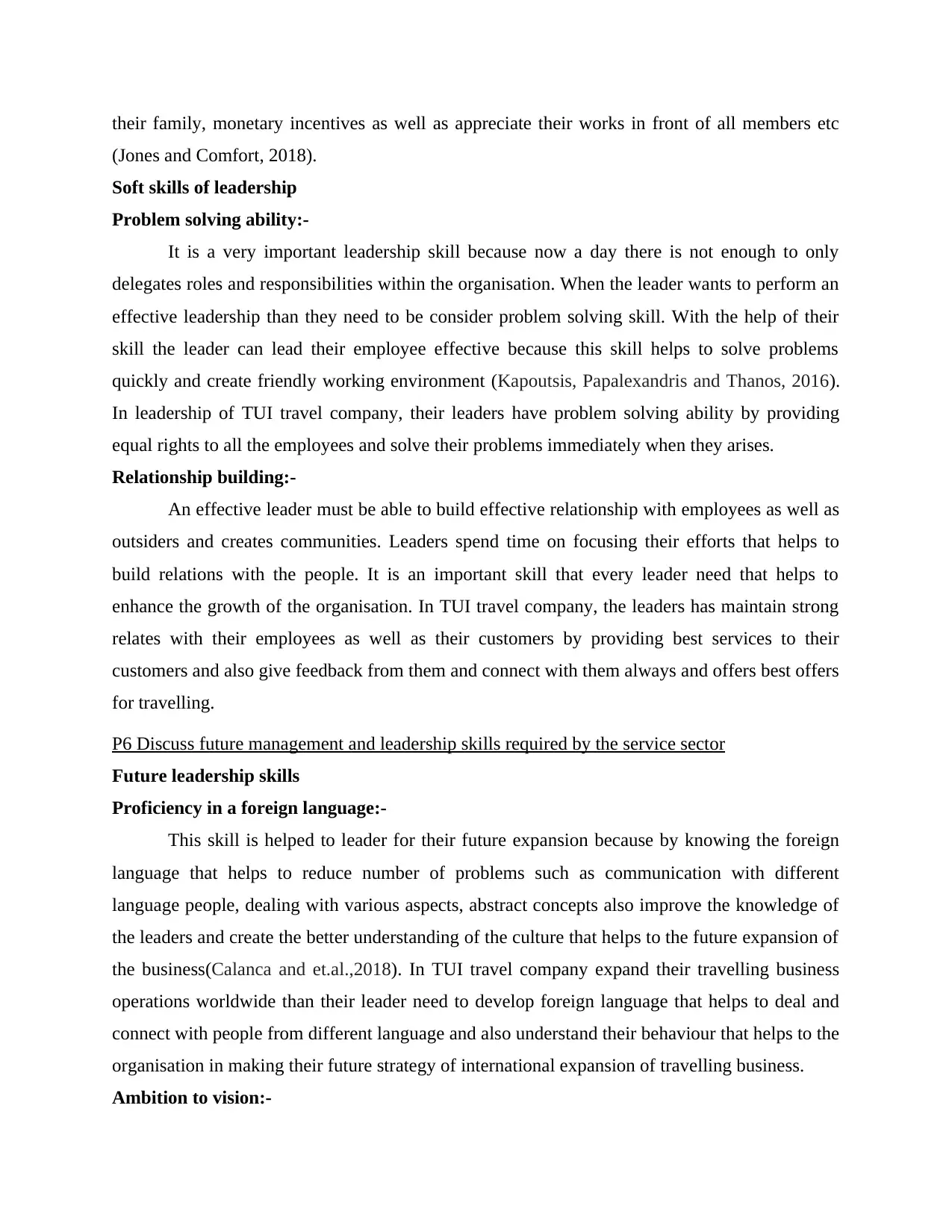
their family, monetary incentives as well as appreciate their works in front of all members etc
(Jones and Comfort, 2018).
Soft skills of leadership
Problem solving ability:-
It is a very important leadership skill because now a day there is not enough to only
delegates roles and responsibilities within the organisation. When the leader wants to perform an
effective leadership than they need to be consider problem solving skill. With the help of their
skill the leader can lead their employee effective because this skill helps to solve problems
quickly and create friendly working environment (Kapoutsis, Papalexandris and Thanos, 2016).
In leadership of TUI travel company, their leaders have problem solving ability by providing
equal rights to all the employees and solve their problems immediately when they arises.
Relationship building:-
An effective leader must be able to build effective relationship with employees as well as
outsiders and creates communities. Leaders spend time on focusing their efforts that helps to
build relations with the people. It is an important skill that every leader need that helps to
enhance the growth of the organisation. In TUI travel company, the leaders has maintain strong
relates with their employees as well as their customers by providing best services to their
customers and also give feedback from them and connect with them always and offers best offers
for travelling.
P6 Discuss future management and leadership skills required by the service sector
Future leadership skills
Proficiency in a foreign language:-
This skill is helped to leader for their future expansion because by knowing the foreign
language that helps to reduce number of problems such as communication with different
language people, dealing with various aspects, abstract concepts also improve the knowledge of
the leaders and create the better understanding of the culture that helps to the future expansion of
the business(Calanca and et.al.,2018). In TUI travel company expand their travelling business
operations worldwide than their leader need to develop foreign language that helps to deal and
connect with people from different language and also understand their behaviour that helps to the
organisation in making their future strategy of international expansion of travelling business.
Ambition to vision:-
(Jones and Comfort, 2018).
Soft skills of leadership
Problem solving ability:-
It is a very important leadership skill because now a day there is not enough to only
delegates roles and responsibilities within the organisation. When the leader wants to perform an
effective leadership than they need to be consider problem solving skill. With the help of their
skill the leader can lead their employee effective because this skill helps to solve problems
quickly and create friendly working environment (Kapoutsis, Papalexandris and Thanos, 2016).
In leadership of TUI travel company, their leaders have problem solving ability by providing
equal rights to all the employees and solve their problems immediately when they arises.
Relationship building:-
An effective leader must be able to build effective relationship with employees as well as
outsiders and creates communities. Leaders spend time on focusing their efforts that helps to
build relations with the people. It is an important skill that every leader need that helps to
enhance the growth of the organisation. In TUI travel company, the leaders has maintain strong
relates with their employees as well as their customers by providing best services to their
customers and also give feedback from them and connect with them always and offers best offers
for travelling.
P6 Discuss future management and leadership skills required by the service sector
Future leadership skills
Proficiency in a foreign language:-
This skill is helped to leader for their future expansion because by knowing the foreign
language that helps to reduce number of problems such as communication with different
language people, dealing with various aspects, abstract concepts also improve the knowledge of
the leaders and create the better understanding of the culture that helps to the future expansion of
the business(Calanca and et.al.,2018). In TUI travel company expand their travelling business
operations worldwide than their leader need to develop foreign language that helps to deal and
connect with people from different language and also understand their behaviour that helps to the
organisation in making their future strategy of international expansion of travelling business.
Ambition to vision:-
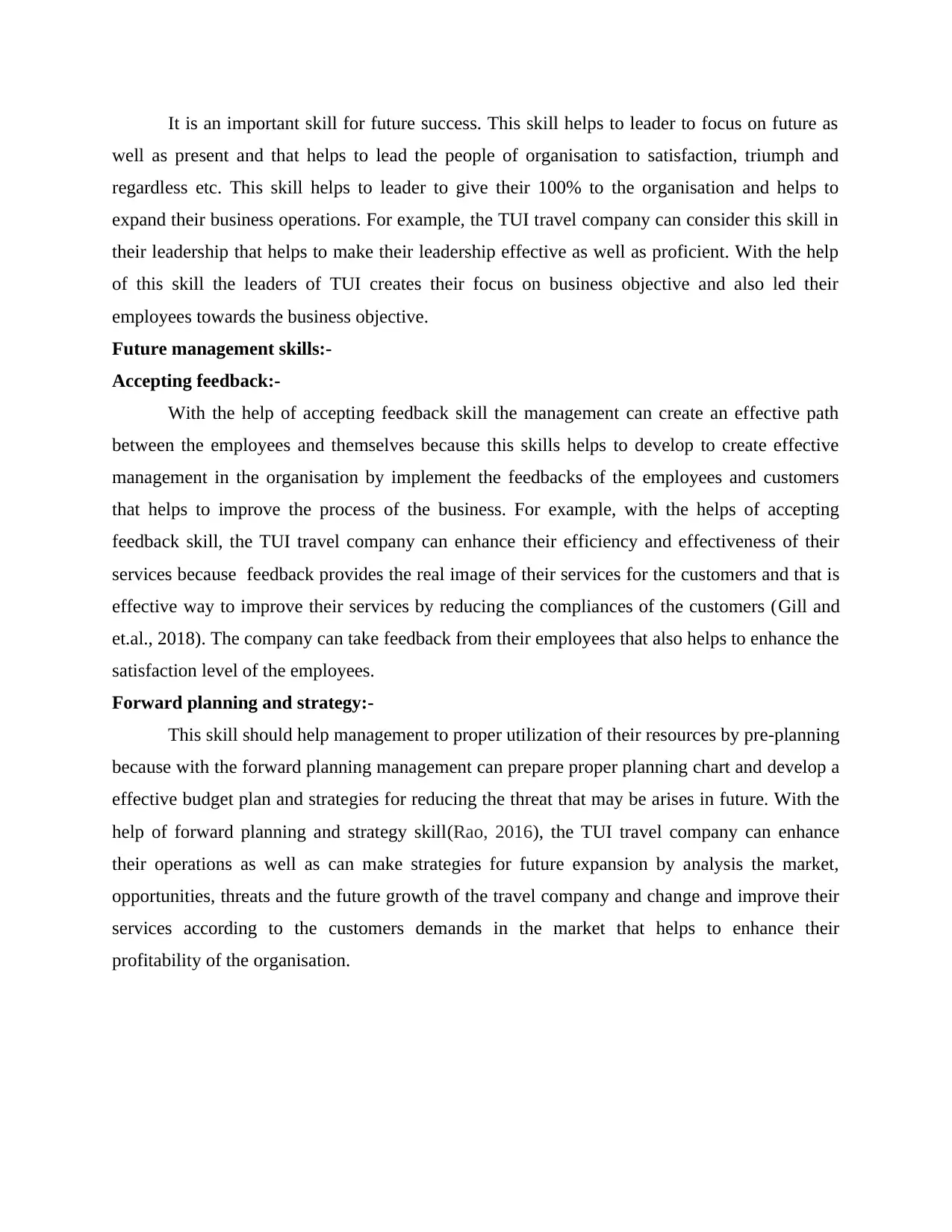
It is an important skill for future success. This skill helps to leader to focus on future as
well as present and that helps to lead the people of organisation to satisfaction, triumph and
regardless etc. This skill helps to leader to give their 100% to the organisation and helps to
expand their business operations. For example, the TUI travel company can consider this skill in
their leadership that helps to make their leadership effective as well as proficient. With the help
of this skill the leaders of TUI creates their focus on business objective and also led their
employees towards the business objective.
Future management skills:-
Accepting feedback:-
With the help of accepting feedback skill the management can create an effective path
between the employees and themselves because this skills helps to develop to create effective
management in the organisation by implement the feedbacks of the employees and customers
that helps to improve the process of the business. For example, with the helps of accepting
feedback skill, the TUI travel company can enhance their efficiency and effectiveness of their
services because feedback provides the real image of their services for the customers and that is
effective way to improve their services by reducing the compliances of the customers (Gill and
et.al., 2018). The company can take feedback from their employees that also helps to enhance the
satisfaction level of the employees.
Forward planning and strategy:-
This skill should help management to proper utilization of their resources by pre-planning
because with the forward planning management can prepare proper planning chart and develop a
effective budget plan and strategies for reducing the threat that may be arises in future. With the
help of forward planning and strategy skill(Rao, 2016), the TUI travel company can enhance
their operations as well as can make strategies for future expansion by analysis the market,
opportunities, threats and the future growth of the travel company and change and improve their
services according to the customers demands in the market that helps to enhance their
profitability of the organisation.
well as present and that helps to lead the people of organisation to satisfaction, triumph and
regardless etc. This skill helps to leader to give their 100% to the organisation and helps to
expand their business operations. For example, the TUI travel company can consider this skill in
their leadership that helps to make their leadership effective as well as proficient. With the help
of this skill the leaders of TUI creates their focus on business objective and also led their
employees towards the business objective.
Future management skills:-
Accepting feedback:-
With the help of accepting feedback skill the management can create an effective path
between the employees and themselves because this skills helps to develop to create effective
management in the organisation by implement the feedbacks of the employees and customers
that helps to improve the process of the business. For example, with the helps of accepting
feedback skill, the TUI travel company can enhance their efficiency and effectiveness of their
services because feedback provides the real image of their services for the customers and that is
effective way to improve their services by reducing the compliances of the customers (Gill and
et.al., 2018). The company can take feedback from their employees that also helps to enhance the
satisfaction level of the employees.
Forward planning and strategy:-
This skill should help management to proper utilization of their resources by pre-planning
because with the forward planning management can prepare proper planning chart and develop a
effective budget plan and strategies for reducing the threat that may be arises in future. With the
help of forward planning and strategy skill(Rao, 2016), the TUI travel company can enhance
their operations as well as can make strategies for future expansion by analysis the market,
opportunities, threats and the future growth of the travel company and change and improve their
services according to the customers demands in the market that helps to enhance their
profitability of the organisation.
⊘ This is a preview!⊘
Do you want full access?
Subscribe today to unlock all pages.

Trusted by 1+ million students worldwide
1 out of 17
Related Documents
Your All-in-One AI-Powered Toolkit for Academic Success.
+13062052269
info@desklib.com
Available 24*7 on WhatsApp / Email
![[object Object]](/_next/static/media/star-bottom.7253800d.svg)
Unlock your academic potential
Copyright © 2020–2026 A2Z Services. All Rights Reserved. Developed and managed by ZUCOL.





